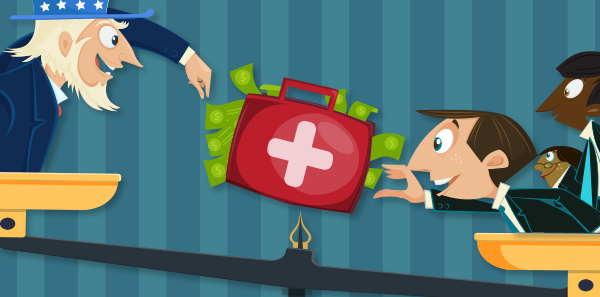
A Few Other Considerations
Single-Payer=Tax-Funded Health Care: The progressive tax system in America means the largest burden of the “health care tax” will fall on higher-income individuals. It is de facto income redistribution, which may seem great until you run out of everybody else’s money. As providers, you may get paid for more people (albeit much less for each), and on the other side, you are also paying their bill (via taxes).
Explore This Issue
ACEP Now: Vol 38 – No 10 – October 2019Single-Payer=Universal Health Care Monopsony: A monopsony is a market structure in which a single buyer substantially controls the market as the major purchaser of goods and services. This single entity has market power over sellers as the only purchaser, much in the same manner that a monopolist can influence the price for its buyers in a monopoly, in which only one seller faces many buyers. As noted, 50 percent of U.S. health care is already publicly funded (taxes). These programs are regulated limited monopsonies in defined populations. Due to little, if any, coordination among these various government programs, they currently do not have the same effect that a true universal monopsony would. In other words, health care providers still have considerable freedom for whom they wish to provide services and at what price. A true single-payer environment would dramatically change these economics. By definition, a monopsony eliminates choice and competition. The government sets the rates. You take it or leave it. If there are not enough “takers,” people wait in line for care (or go to the emergency department).11
Single-Payer=Aspirational (versus Politically Viable=Reality): Some have called for a physician-friendly single-payer plan. I believe that is a false hope; one might say bait and switch. The fact is, we have no idea what the implications and outcomes might be of implementing single-payer health care in the United States. In the end, it’s all conjecture (or, perhaps more accurately, rhetoric). A lot of promises and projections have been made with every major government program, and to my knowledge, they have nearly always been wrong, and not for the better. The most recent health care example: What would the ACA vote have been if we knew then what we know now? “You can keep your doctor, your hospital, your health plan.” “Premiums will be lower.” “It will increase choice.” All (grossly) false promises.
Net-Net for Emergency Physicians: Under single-payer, we may have lower (perhaps much lower) compensation, deal with patients experiencing a delay in receiving services, and pay (much) higher individual taxes. If we are going to propose a single-payer system, we need to own up to these realities and not act like they will not happen “if done right.” These things will necessarily happen because that is doing it right under single payer.
Single-Payer=Economic Disaster: Health care is now the largest private-sector industry in the United States, and in some cities it represents more than 25 percent of all jobs.12,13 In 2017, $3.3 trillion ($10,348/person and 17.9 percent GDP) was spent on health care.14 Private health insurance represented 34 percent ($1.122 trillion) of that spend.15 You do not have to be a genius to know what would happen if you “nationalize” a >$1 trillion segment of the health care industry (about 6 percent of GDP). How would United Healthcare ($245 billion market cap), WellPoint ($232 billion), Aetna ($177 billion), CIGNA ($178 billion), Humana ($293 billion), and all the other insurance companies and shareholders respond to nationalization from a government program (eg, Medicare-for-all)? A government takeover like this would clearly be unprecedented in American history.
Single-payer will never happen, and if it does, it would precipitate an economic depression. But the good news is you would have free mental health services for your emotional depression.
Pages: 1 2 3 4 | Single Page




No Responses to “Opinion: Single Payer Health Care Would Be Detrimental to Emergency Physicians”